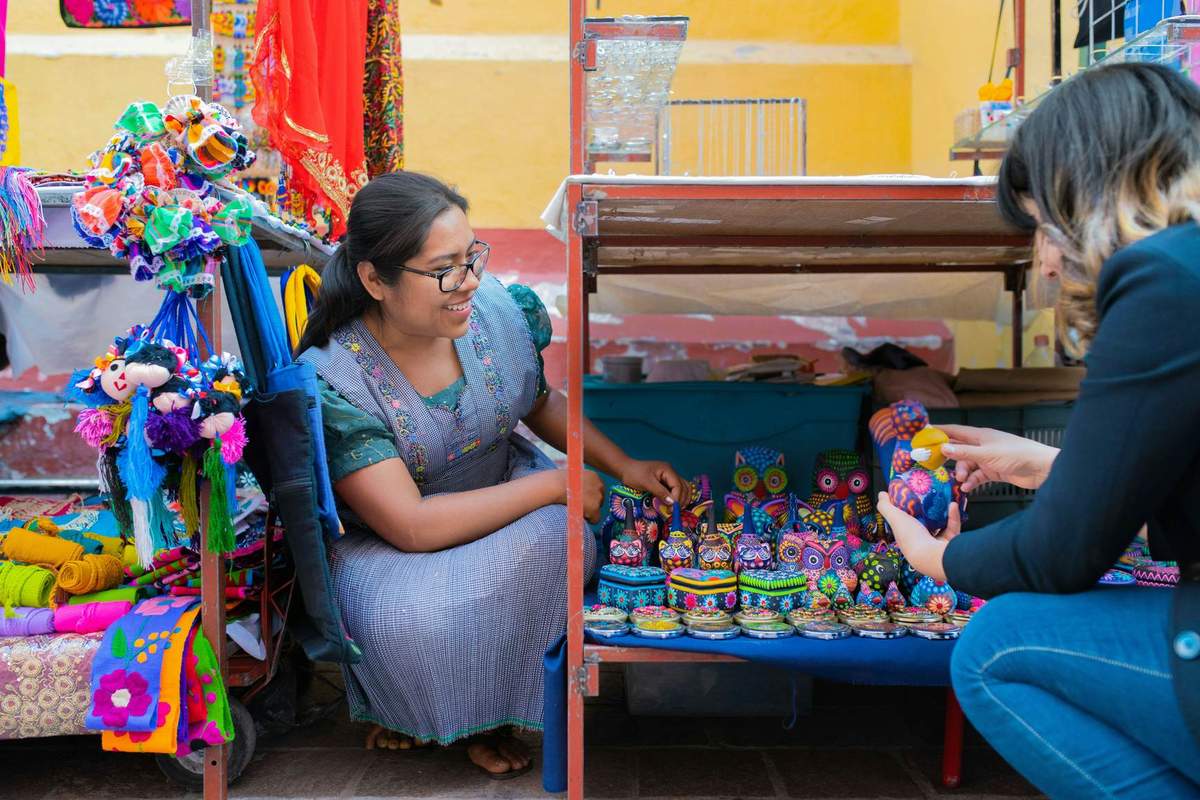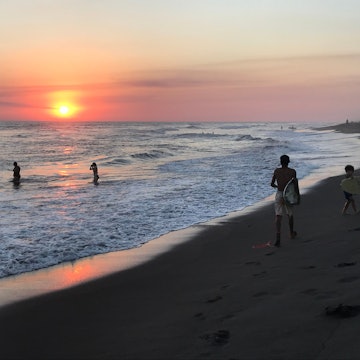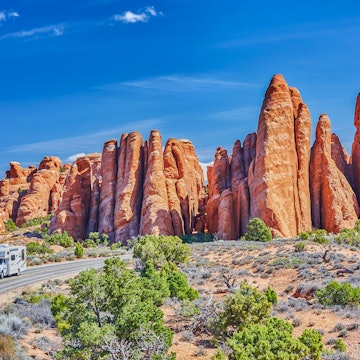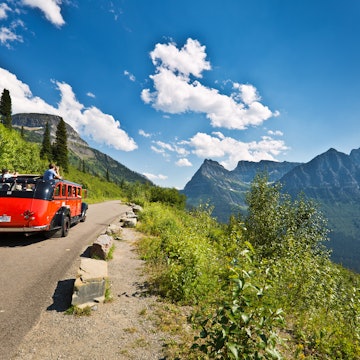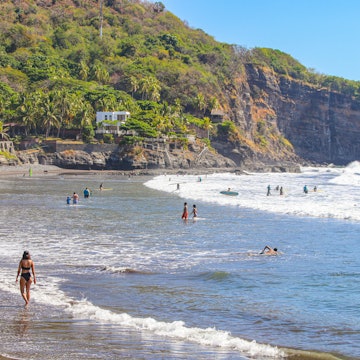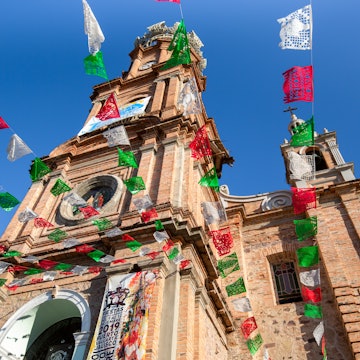

Nearby Teotitlán del Valle is the ideal spot to learn more about Oaxaca's centuries-old weaving tradition © Marco Bottigelli / Getty Images
Inexpensive lodging and affordable street food mean Oaxaca delivers plenty of bang for your buck – add a plethora of free attractions to the mix and the colorful city is about as budget-friendly as they come.
Cultural activities abound in Oaxaca, many of which won't set you back a single peso. Scores of free museums, galleries and workshops showcase locally produced arts and crafts, such as intricately designed black pottery, hand-woven Zapotec rugs and surreal mythical animal sculptures.
Downtown, Oaxaca spoils budget travelers with its walkability, ubiquitous street art, stunning baroque architecture and public squares full of music and dance.
Here's how to experience this splendid corner of southern Mexico on the cheap.

1. Discover vivid urban art on cobbled streets
Local artists have transformed the streets of Oaxaca into an outdoor gallery, with brilliantly painted murals and satirical stencils adorning the walls of the historic centers of Jalatlaco, Xochimilco and the Centro. All three neighborhoods lie within walking distance of one another, so you can easily explore them on a self-guided walking tour that costs absolutely nada.
In Jalatlaco, look for the Day of the Dead-inspired murals along the streets of Aldama, 5 de Mayo and Hidalgo, while in the weaving district of Xochimilco, a barrio dating back to the 15th century, vibrant works color the cobbled blocks of Calle Alavez.
2. Feast your eyes on captivating photos at Centro Fotográfico Álvarez Bravo
Named after the revered Mexican photographer Manuel Álvarez Bravo, this former residence of Oaxacan artist Francisco Toledo displays free exhibits of weird and wonderful images captured by contemporary talent from Mexico and abroad. From time to time, it also shows works from its permanent collection of some 100,000 photographs, including pictures by Álvarez Bravo, Henri Cartier-Bresson, Graciela Iturbide, Mary Ellen Mark and other highly influential figures in the world of photography.
Toledo founded Centro Fotográfico Álvarez Bravo and the nearby Graphic Arts Institute of Oaxaca, which also hosts free expositions.
3. Browse the mesmerizing galleries and craft stores
Oaxaca famously produces some of the highest-quality folk art in the nation, so even if you have no intention of buying anything, you should definitely peruse the spectacular wares. Shops and galleries, many along the Centro's Calle Alcalá, sell everything from barro negro (polished black pottery) and alebrijes (brightly painted mythical animal sculptures) to hand-crafted textiles and palm-leaf baskets.
The exquisitely designed copal-wood alebrijes on display in Voces de Copal fetch a pretty peso, but it costs nothing to look, while nearby gallery Mano Mágica features hand-woven Zapotec rugs and artwork by Oaxacan masters such as Toledo, Tamayo and Morales.
4. Embrace Oaxaca's world-famous textile tradition at Museo de Textil
With over 10,000 Oaxacan and international textile pieces, many more than 100 years old, the free Museo de Textil showcases traditional garments and other hand-woven objects through exhibitions, workshops and a library.
For a deeper dive into Oaxaca's colorful world of textiles, a craft that has flourished in the region since 500 BCE, head for the renowned weaving town of Teotitlán del Valle (15 miles east of downtown), where Zapotec family-run workshops make colorful rugs and tapestries on old-school pedal looms.

5. Soak up the Zócalo's energy and live entertainment
For hours of cost-free fun, mosey over to the tree-shaded Zócalo and watch the playful street artists and marimba musicians work the crowds on the city's iconic main square and the adjoining Alameda de León plaza. Home to the striking 16th-century Metropolitan Cathedral and the muraled State Government Palace, the vibrant squares really come to life when brass band ensembles perform or sharply-dressed couples dance to elegant danzón music.
If there’s a lull in the activity, wander around the nearby Andador Turístico, a traffic-free pedestrian corridor lined with galleries, craft shops and cafes serving gourmet coffee hailing from Oaxaca's highlands.
6. Immerse yourself in contemporary art and nature in San Agustín Etla
Most folks head to the picturesque town of San Agustín Elta to visit the Centro de las Artes, and for good reason: the old textile factory, which was lovingly converted into one of Oaxaca's premier contemporary art spaces, draws high praise for its absorbing exhibits and an innovative ecological design (its sublime pools are part of a gravity-powered water system that keeps the striking 19th-century building pleasantly cool).
After checking out the cutting-edge installations, take a stroll around the surrounding grounds amid waterfalls and lush vegetation, or explore even more along a nearby Aqueduct Trail that rises up into the scenic hills. To reach San Agustín Etla (11 miles northwest of Oaxaca), affordable shared taxis depart from the Mercado de Abastos.
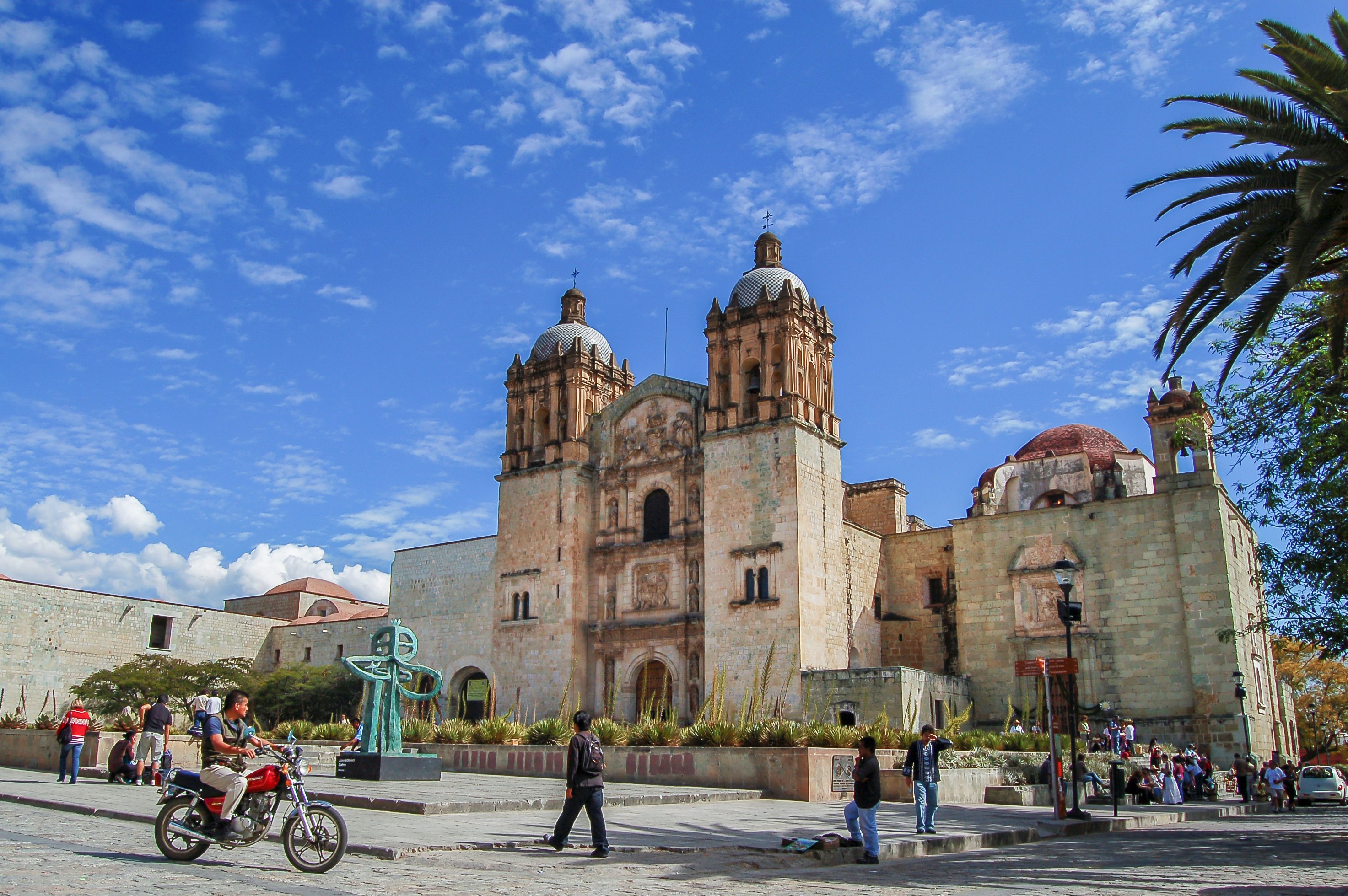
7. Marvel at majestic architecture
With a whopping 1200 historical monuments, the Centro has deservingly earned its UNESCO World Heritage badge. Among the noteworthy sights are a pair of iconic baroque buildings: the 16th-century Templo de Santo Domingo and its adjoining former Dominican monastery (now home to Oaxaca’s Museum of Culture); and the Basílica de Nuestra Señora de la Soledad, known for its sparkling, florid and gold-tinged interior and a cantera façade that dates from 1690. Both were built with extremely thick walls to withstand Oaxaca's strong earthquakes.
Another emblematic sight, the Xochimilco Aqueduct, was built in the 1700s to bring fresh drinking water to downtown. Though it ceased operations in 1940, some of the arches along Calle Rufino Tamayo are still used as entryways into homes.
8. Take in sweeping city views from Cerro del Fortín
Oaxaca’s sentinel Cerro del Fortín affords panoramic views of the city, making it the go-to spot for an early-morning run or walk. Head up the stairway off Calle Crespo, which ascends to the Auditorio Guelaguetza, an open-air auditorium that hosts the Guelaguetza Festival, a widely popular indigenous dance and music event held in July. Above the concert venue, a paved road rises up to a planetarium and a Christian cross. When visiting the Cerro, the upper reaches of the hill are best avoided at dusk and after dark.
9. Watch local artisans work their magic
In several of Oaxaca's nearby towns, rustic workshops provide fascinating free tours of their facilities as they reveal some of the secrets of their trade. Head to San Bartolo Coyotepec to observe the black pottery process, or venture further south to alebrije capital San Martín Tilcajete, where the busy workshop of Jacobo and María Ángeles crafts colorful wooden animal sculptures, some so intricate that they take years to make.

10. Wander through markets bursting with local flavor
A trip to Oaxaca wouldn't be complete without visiting its vibrant old markets where not only will you find some of the most affordable mole dishes in town but also an intriguing mishmash of uniquely Oaxacan stuff. Along the aisles in centrally located mercados such as 20 de Noviembre and Mercado de la Merced you'll come across Day of the Dead dioramas, huipiles (embroidered tunics), crunchy chapulines (roasted grasshoppers for your snacking pleasure) and a slew of other local curiosities.






